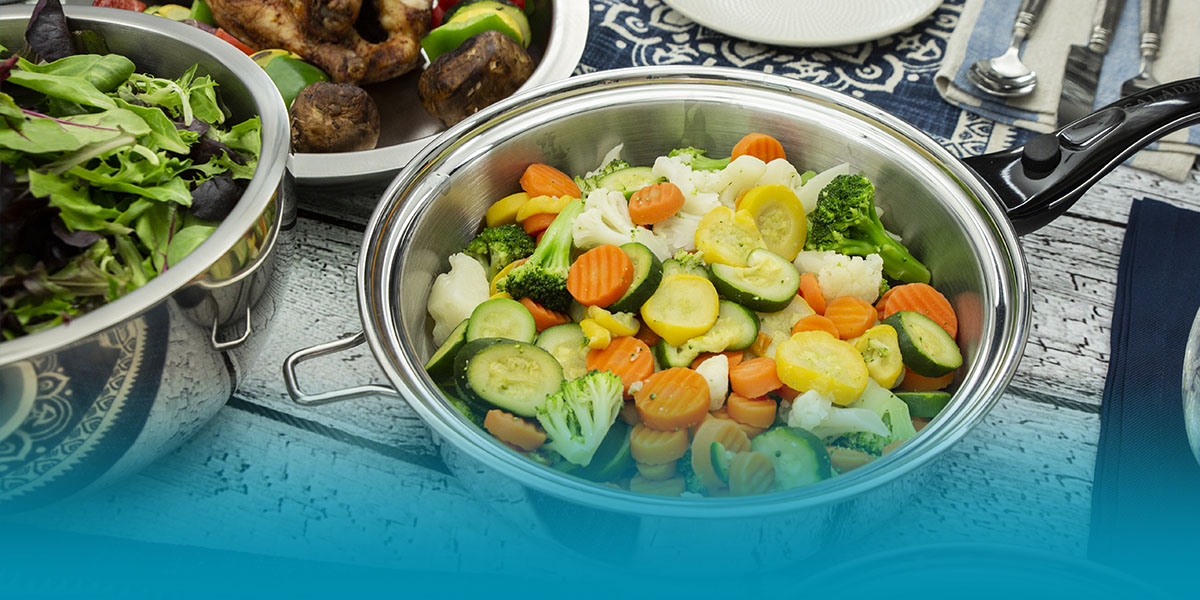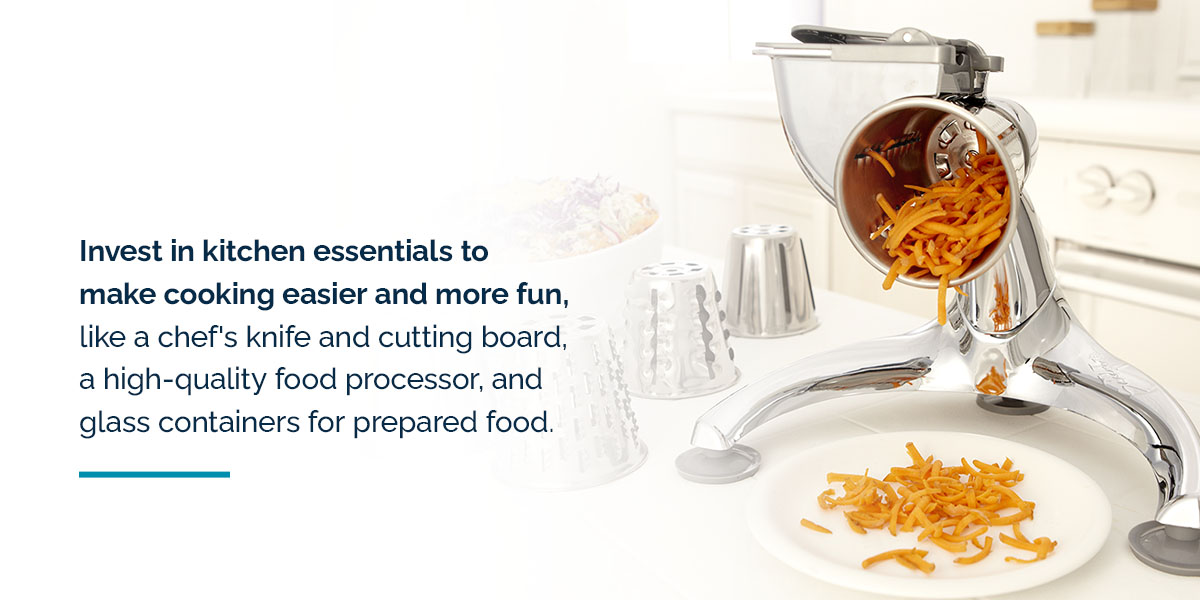How to Cook Healthier at Home

Learning to cook healthy meals at home makes sense financially and for your well-being. You likely lead a busy life — whether raising kids, advancing your career or both. Eating nutritious foods and using healthy cooking techniques may sound like too much work in too little time, but positive habits start with minor changes.
With some simple tips, you can change your cooking habits, prepare healthier meals, and enjoy the many benefits of cooking and eating healthy.
The Benefits of Healthy Food Preparation
Knowing how to cook healthy food at home can transform your everyday life. It changes how you look and feel and benefits your loved ones. Check out the benefits of choosing the right ingredients below.
Keep Your Heart Healthy
Heart disease is the leading cause of death in the United States, and an unhealthy diet is one of the primary reasons it's so prevalent. Lifestyle changes such as healthy eating and appropriate physical activity could prevent up to 80% of premature heart diseases and strokes. High blood pressure, or hypertension, can be a symptom of excessive salt and saturated fats in your diet. Healthy eating can lower your blood pressure and reduce the risk of heart complications.
Reduce Cancer Risks
Eating certain foods has been shown to reduce the risk of developing cancer. Antioxidant-rich options such as berries, carrots, leafy greens, nuts and seeds can reduce free-radical damage. Eating plenty of vegetables, fruits and fiber can reduce the risks of gastrointestinal, colorectal and liver cancer.
Obesity can result in poorer treatment outcomes, and a healthy diet can help your body fight off many other diseases.
Elevate Your Mood and Energy Levels
The right diet choices can improve your mental health and energy levels throughout the day without sudden slumps.
Improve Your Gut Health
A healthy, high-fiber diet can decrease gut inflammation and provide a balance of prebiotics and probiotics that help good bacteria and improve various digestive issues.
Enhance Your Memory
A healthy diet can improve your brain as well as your body. Certain foods can enhance your memory and prevent age-related cognitive decline.
Lose Weight Healthily
Maintaining a healthy weight is essential to prevent many health issues, including type 2 diabetes, stroke, heart disease and osteoarthritis. Healthy foods like fruits, vegetables and legumes are lower in calories and easy to digest. A healthy diet free of processed food and unhealthy fats can help you maintain a healthy weight. It's also essential for weight loss.
Manage Your Diabetes
Whether you have diabetes or are prediabetic, your diet is one of the most effective management tools. Eating a healthy diet and limiting your salt and sugar intake can help manage blood glucose levels, blood pressure and cholesterol, preventing or delaying diabetes-related complications.
Strengthen Your Bones
Nutrients like calcium and magnesium can keep our bones healthy, minimizing the risk of osteoporosis-related issues and allowing you to live a full and active life.
Sleep Better
A healthy diet can help you sleep better. When you pay little attention to your diet, you can ingest foods that end up interrupting your sleep. Maintaining a healthy weight can also prevent sleep apnea. This condition interrupts sleep and can lead to other health issues like heart complications. For example, cutting out caffeine and alcohol can help you sleep better.
Tips for Cooking Healthy Food at Home
Make your beloved family recipes more nutritious with a few simple substitutions. It's as simple as making the following adjustments.
1. Start With the Shopping
Be intentional with your shopping so you have healthy ingredients to work with every time you cook. Follow these shopping tips to keep healthy options coming into your kitchen:
- Plan: Decide what you're eating and plan your week.
- Make a list: Write a detailed shopping list and stick to it to resist the temptation to buy what you want in the moment.
- Keep it accessible: Choose quick and easy-to-cook options so you always have time to eat healthy.
- Work with the seasons: Stock up on fresh, seasonal produce like fruit, vegetables, nuts and seeds.
2. Prime Your Kitchen
Set up your kitchen to facilitate healthy cooking. Swap out plastic storage containers, replace your old cutting boards and check your cleaning products for toxins. Uncovering all the hidden chemicals lurking in your kitchen can support your healthy lifestyle.
If you're worried about buying fresh produce and letting it spoil, arrange your fridge so you'll remember which items to use first or write the expiration date on each container.

Invest in kitchen essentials to make cooking easier and more fun, like a chef's knife and cutting board, a high-quality food processor, and glass containers for prepared food.
3. Switch Out the Salt
A diet high in salt can cause various health complications and increase the risk of heart disease. Reduce the salt in your diet with the following tips:
- Taste first: Before you add salt to your cooking, taste it first. There might be enough flavor without adding more.
- Choose fresh or frozen: Canned and pickled vegetables are often packaged with salt, so opt for fresh or frozen options when possible.
- Limit processed meats: Cured meats are preserved with salt. While you can enjoy the occasional treat, watch your intake of ham, salami, bacon, corned beef and other processed meats.
- Get creative with seasoning: Herbs and spices are delicious additions to any meal and can be sensible salt substitutions. Consider flavorful options like garlic, dried herbs and chili to bring your cooking to life.
4. Remove Excess Cooking Oils
Cooking with oil often adds salt, fat and calories to your meals. Oil-free cooking is an alternative that promotes weight loss, removes excess fat and helps limit your salt intake. Replace your cooking oil with polyunsaturated and monounsaturated fats like avocados, seeds, nuts and certain fish to ensure you get the healthy fats you need.
5. Adjust Your Cooking Methods
Cooking affects the nutritional value of your food. Avoid more ineffective cooking methods like frying, steaming and microwaving and opt for the following options instead:
- Baking and roasting: Cooking on low heat can help foods retain their nutrients.
- Broiling: This method involves submerging foods entirely in water. While you may have mineral losses with this method, they're minimal. Broiling also reduces the saturated fat in red meat.
How the Right Cookware Can Help You Cook Healthier at Home
Your cookware can make your food healthier. For example, nonstick cookware is coated with a chemical called Teflon. While convenient and easy to wash, this cookware is associated with health implications that could undermine your cooking efforts. Cooking with good quality stainless steel has significant health benefits, including removing harmful chemicals. It's easy to clean and sanitize without potentially toxic cleaning chemicals and doesn't react with acidic foods.
The right cookware also supports healthy cooking methods like roasting and broiling, so investing in quality stainless steel is an excellent choice for a healthy home.
Start Eating Healthier and Get the Right Tools From a Saladmaster® Dealer Near You

Cooking healthy is an exciting way to spice up your menu and explore new preparation options. The first step in transforming your eating habits is to ensure you have the right tools to set yourself up for success.
At Saladmaster, we're passionate about bringing healthy meals into your home. Our premium 316Ti stainless steel cookware sets are perfect for starting your new health journey. They're durable, easy to clean and nonreactive to acids and enzymes in your food. Our semi-vacuum Vapo-Valve™ technology protects the flavor and nutrients in your ingredients so you can skip the salt and get the most from every meal.
If you're ready to start your healthy eating journey with everything you need, browse our high-quality cookware selection and find a dealer near you today.
8884